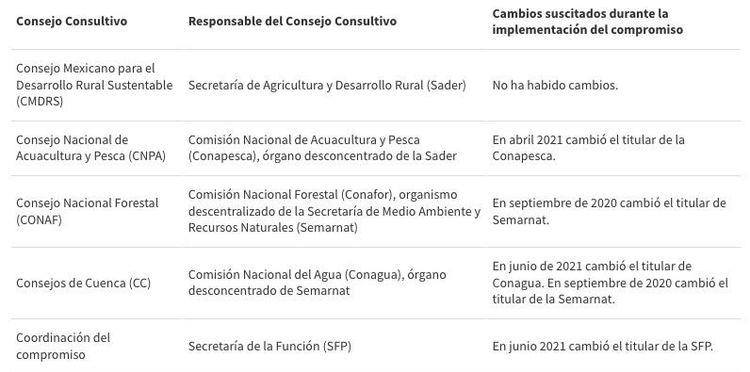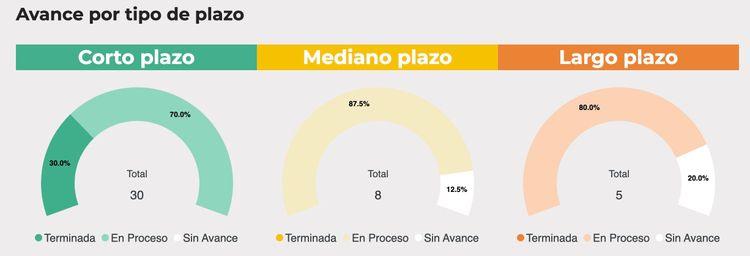Advisory Councils are institutionalized citizen participation mechanisms that allow citizens to have a greater impact on the planning, execution and evaluation of public policies.
They arise from the need for citizens to participate more in public life and that public life is not limited only to voting. This new way of participating was accompanied by regulatory changes and the signing of international treaties. In 1983, Art. 26 of the Mexican Constitution was amended, introducing the concepts of democratic planning, participation and citizen consultation that led to the enactment of the Planning Law (1).
In environmental matters, and starting with the 1992 Rio Declaration on Environment and Development, Mexico committed itself to facilitating and encouraging citizen participation and access to information by environmental authorities, as a way of dealing with environmental problems (2)
More than thirty years have passed since then and making society's participation in environmental public policies a reality has not been easy at all. In 2012, Gómez Magaña et. al. described the National Advisory Councils as a “generic exemplification of bad practices in the area of citizen participation” (3). In the same vein, Hevia et. al. (2011) commented that citizen participation mechanisms are abundant, but opaque, calling into question their sufficiency and legitimacy (4).
A new push came in 2018 when member countries of the Economic Commission for Latin America and the Caribbean (ECLAC) signed the Regional Agreement on Access to Information, Public Participation and Access to Justice in Environmental Matters in Latin America and the Caribbean, known as the Escazú Agreement. This agreement seeks to move towards greater environmental protection and more environmental rights at the local level (5).
With the Escazú Agreement, the Mexican State is committed to “implementing open and inclusive participation in environmental decision-making processes”, for which it must “guarantee mechanisms for participation in environmental decision-making processes that can have a significant impact on the environment” (5).
The commitment of the Mexican State to strengthen citizen advocacy for sustainable rural development within the framework of the Open Government Alliance (2019 - 2022)
In 2019, within the framework of the Open Government Alliance (made up of the Nucleus of Civil Society Organizations - NOSC -, the National Institute for Transparency, Access to Information and Protection of Personal Data - INAI - and the Secretariat of Public Service - SFP -) and with the signing of the Escazú Agreement very recently, a participatory workshop was held in which it was concluded that “participation mechanisms in rural and environmental matters have a poor institutional design that does not allow vulnerable groups are not represented, nor are deliberation and co-management in government actions” (6).
As a result of this diagnosis, a co-creation process was carried out from which the commitment 'Citizen Advocacy for Sustainable Rural Development' emerged with the purpose of strengthening four mechanisms of citizen participation: i) National Council for Aquaculture and Fisheries, ii) Mexican Council for Sustainable Rural Development, iii) National Forestry Council and iv) Basin Councils.
This commitment took place from December 2019 to August 2022, in an adverse context. In addition to the Covid 19 pandemic, which began almost at the same time as the commitment, as can be seen in the following table, there were also changes in almost all the institutions responsible for implementing it, including its coordination:

Despite this, this commitment achieved great achievements. Among them, the carrying out of prospective evaluations by civil society organizations Causa Natura and the Citizens' Comptroller's Office for Accountability, from which recommendations were drawn to improve the inclusion, incidence, autonomy, transparency, accountability and co-responsibility of each council:
● Final Results and Recommendations derived from the CNPA Prospective Evaluation
●Final Results and Recommendations derived from the CMDRS Prospective Evaluation
● Final Results and Recommendations derived from the CONAF Prospective Evaluation
These recommendations were fed back by the responsible government bodies, on the basis of which action plans were drawn up for the implementation of the recommendations:
In addition, a Monitoring Platform was built to inform members of the Advisory Councils and the general public about progress in implementing recommendations for improvement.
Finally, a great merit of this commitment was the joining forces of the different levels of government that, together with civil society, worked in a coordinated manner for three years, making this one of the commitments of the 4th Plan of Action with the highest level of compliance (7).
What progress has been made in implementing this commitment?
Since last August 2022, there have been no follow-up meetings coordinated by the Secretariat of the Public Service (SFP). One of the major challenges was to agree on an Action Plan with Conagua to implement improvements to the Basin Councils (CC). Unfortunately, this process could not be carried out because the SFP suspended its coordination work after the #Ejército Spy conflict with the NOSC after cases of espionage had been revealed to journalists and human rights defenders (8). Nor has there been any political will on the part of Sader and Conapesca, whose implementation of the CMDR and CNPA Action Plans came under their responsibility.
However, there is the exceptional case of CONAF, which has made substantial progress in implementing its Plan of Action. Of 43 recommendations, 32 of them are in the process of being implemented, 9 have been fully completed and there are only 2 recommendations pending to start.
Progress on the recommendations of the CONAF Action Plan

CONAF is today a cutting-edge citizen participation mechanism that has a website where you can find out what CONAF is, who makes up it, who are its members and alternates, what powers it has and what its regulations are.
In addition, the calls, the issues discussed and the minutes of agreements of each of the sessions are recorded there, thus giving transparency and accountability for their actions, not only to the members of the Council but to society as a whole.
Its 2021-2024 Strategic Plan is also downloadable on its website, which includes the results of the prospective evaluation and its recommendations in five major strategies.
Get to know the CONAF website here
Get to know their internal regulations here
Learn about their 2021-2024 Strategic Plan here
The case of CONAF is undoubtedly a reference for other participation mechanisms that to date have not been able to be consolidated. @Conafor leaves us a great learning experience that must undoubtedly be taken up by @Semarnat @Sader @Conapesca @Conagua and @SFP.
The work of three years must not be forgotten, it must be resumed to enforce the Constitution, our federal laws and the international agreements to which the State is committed to making open and inclusive citizen participation a reality in rural and environmental decision-making processes.



Comentarios (0)